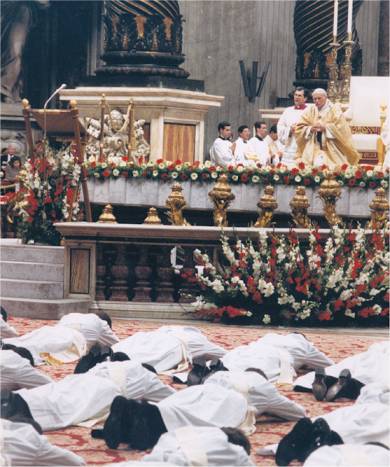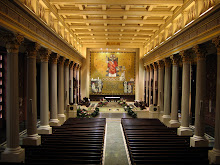St. Mark is one of those figures from the Early Church where most of what we know about him is speculation, or has been transmitted down through history in an almost mythical way. However, that is not to say that it is not accurate, we just do not have some of the sure details that we, as 21st Century Americans, like to have.
This speculation, or these indications, from history include the following points:
1) He was not part of the original Twelve Apostles, rather it seems that he is a native of Jerusalem and it is speculated that it was his house that was used as the meeting place for the Last Supper; he was likely a teenager at the time.
2) During the Passion Narrative, there is one curious figure who appears: “Now a young man followed him wearing nothing but a linen cloth about his body. They seized him, but he left the cloth behind and ran off naked." (Mark 14:51-52) This singular young man is speculated to be the future evangelist, and lends credence that the Last Supper was held at his place, and he sort of ‘snuck out’ to join Jesus and the Twelve during their night of prayer.
3) Finally, there is a figure who appears periodically in the Acts of the Apostles, and we’ve just heard about him over the last weeks: John Mark. Again, there is ancient testimony that links this man with this Evangelist. This John Mark is a some-time companion with Paul and Barnabbas, especially during their first missionary journey to Asia Minor. However, it seems that the persecution that they were facing was too much for him at the time and he had to leave Paul’s side and returned, apparently, to Jerusalem where he joined up with Peter. This final detail is important because as Paul and Barnabbas were preparing to go on their second journey, Barnabbas wanted to bring John Mark with them; but Paul refused because he had deserted them once and was fearful that he would desert them again.
Now, these points of history are certainly interesting from the historical point of view and give us some of the intriguing story lines from the early church, but they also have some impact in what we have gathered here today to celebrate and prayer for: perseverance of priests and an increase in more vocations.
The first point relates to the fostering of Vocations. The young evangelist is home, when the preparations begin for an unexpected visitor. (Is he the ‘certain man’ Jesus’ Apostle’s were sent to find?) This unexpected encounter leads to a thirst to get to know Our Lord better, apparently even leading him to sneak out of the house to join with this band of men. He aspires to join with them, he aspires to be near to Our Lord. His life is changed forever from this one encounter.
For today, we have to help our young people to have that same desire to ‘be with Jesus.’ He is the one who opens the heart to call to follow, a radical call to discipleship. His presence is the one that changes the path of life forever. Yet, our young people of today often do not have the witness of the older generation, of their parents, of having a radical discipleship with Jesus. Hence the need to model that ourselves: first the priests, but also among the family. Is the family a house of prayer, ready to welcome Our Lord should he be passing by the way?
Second, for some, this encounter with Our Lord is a unique call to leave it all behind to follow after Jesus. Here, in the case of St. Mark, he apparently gets up in the middle of the night and goes forth wearing only a cloth. He follows Jesus out into the Garden; he leaves behind his family and the life he has known. On this night, he experiences the first challenge in response to discipleship: the possibility of arrest. This was a counter-cultural movement, one that placed him at odds with the established government and culture at the time. It does not take much examination of the wider culture to recognize we are in a similar situation today.
Often when I meet with a potential candidate for the first time, I ask about the potential challenges he faces. Family support is often mentioned, but also the demands that the wider culture and his peer support seem to go against his response. He is nearly trapped by the expectations for money, the rampant sexualization of the culture, and the challenge ‘to be successful.’ Admittedly, some do get grabbed by these traps and fall away from the potential call to the priesthood. Hence the importance of prayer for the perseverance of vocations, the perseverance of those called that they can give everything to follow Jesus. Just as John Mark was nearly overwhelmed by these demands, so are so many of those who have a potential to be excellent priests and religious.
Finally, the demands placed upon those who ‘make it through to completion’ and are ordained as priests are many, varied, and difficult. Often, through the demands of obedience we are placed in situations that are not of our own choosing, just as John Mark was elected and joined with St. Paul in the initial stages of his journeys throughout the then known world. Sometimes it can be overwhelming for the man, and he experiences the need to step away, as John Mark did. This can be catastrophic for the man who desires to give more, yet is feeling some reluctance, a reluctance that he may not even be able to articulate and clarify. Why did St. Mark leave Paul and Barnabbas? We will never know. What we do know is that it did cause further division and strife. This can be exceedingly difficult to overcome, and has a lasting impact, as it did between Mark and Paul.
Yet, in the midst of this and ‘the rest of the story’ is that Mark did not give up, but saw this as a new path, a new direction in his journey. After he left Paul, there is a vein of history that says that he joined up with St. Peter, and that the Gospel according to Mark is also the Gospel according to Peter: Mark becomes Peter’s stenographer, as it were, giving us this image of Jesus on fire with preaching, moving from event to event eager to spread the message that the Father had given him. Interesting. What would have happened had Mark given up after his dismissal from Paul? We might not have this depiction of Jesus as the roaring lion of Judah, as presented in this shortest of canonical Gospels.
Hence the final application for today: prayer for your priests. We are often asked for things that we have no training for; demands are placed upon us which seem to be above and beyond what we are capable of. Sadly, sometimes we fail to meet these expectations and it can cause a crisis of faith, a struggle to follow our Lord, yet knowing that I am a sinner in need of redemption. There can be a constant struggle within the priest that he is an agent of salvation for others, yet also in need of that salvation himself. Your prayers and support for the priest, for your priest, can make a world of difference to this man. On a personal note, I fondly remember those 6:30 AM Masses before I would head off to teach for the day as I was first ordained. Having a crowd of 60, 80, even 100 of the faithful gathered to begin their day in worship and prayer of Our Lord energized me, allowed me to look forward to spending my day at the high school, bringing Christ with me as I went. I thank them for this one particular blessing. And as I work now as Vocation Director, I have come to know all the more that a happy priest is the best recruiter for more priests: help you priest to be happy!
In closing, what are the steps we need to take at this point in history? I think they are simple, yet profound; easy to begin, yet hard to bring to fruition:
First: introduce our young people to Our Lord, especially in the Blessed Sacrament; in the context of the Church; among the faithful.
Second: prayer for vocations, our Holy Father reminded us of the great importance of prayer in this endeavor during his address to the Bishops of our country. The call to a vocation is difficult to respond to, is difficult to even hear; pray that those who are being called can respond generously to this invitation.
Finally: support, not only our seminarians, but also the priests you know. Support them through your prayers, again, but also through the acts of kindness and charity. We so often only hear the bad news: someone who has a bone to pick with a homily we have given, questions as to why we missed a particular meeting; why we haven’t done more to support the school, etc. It is nice to hear that a homily has been well received and that the faithful have heard the challenge given in a loving, yet direct way.
I am convinced that we are on the cusp of a great tide in vocations to the priesthood, religious and consecrated life; yet we need the support of all the faithful that this tide not be missed. Thank you for your continued prayers for my ministry, and please be assured of my prayers for you.
Friday, April 25, 2008
Subscribe to:
Post Comments (Atom)










2 comments:
Wow...great homily.
I find happy priests inspiring.
Thanks for your homily. I was looking for the answer as to why Mark left Paul and Barnabas on the first journey. I thank you for saying we will never know. I can go to bed now. :)
Post a Comment